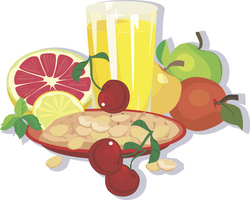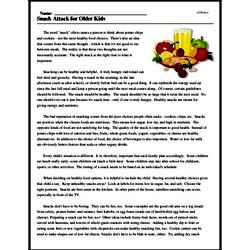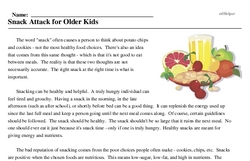Snack Attack for Older Kids
The word "snack" often causes a person to think about potato chips and cookies - not the most healthy food choices. There's also an idea that comes from this same thought - which is that it's not good to eat between meals. The reality is that these two thoughts are not necessarily accurate. The right snack at the right time is what is important.
Snacking can be healthy and helpful. A truly hungry individual can feel tired and grouchy. Having a snack in the morning, in the late afternoon (such as after school), or shortly before bed can be a good thing. It can replenish the energy used up since the last full meal and keep a person going until the next meal comes along. Of course, certain guidelines should be followed. The snack should be healthy. The snack shouldn't be so large that it ruins the next meal. No one should ever eat it just because it's snack time - only if one is truly hungry. Healthy snacks are meant for giving energy and nutrients.
The bad reputation of snacking comes from the poor choices people often make - cookies, chips, etc. Snacks are positive when the chosen foods are nutritious. This means low-sugar, low-fat, and high in nutrients. The opposite kinds of food are not satisfying for long. The quality of the snack is important to good health. Instead of potato chips with lots of calories and fats, fruits, whole-grain foods, yogurt, vegetables, or cheese are healthy alternatives. In addition to the choice of food, the choice of beverages is also important. Water or low-fat milk are obviously better choices than soda or other sugary drinks.




